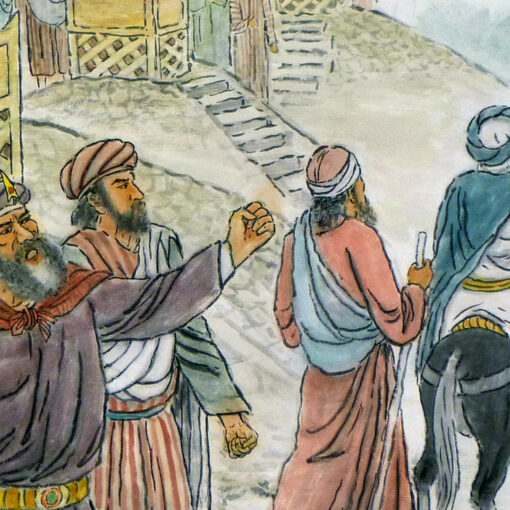Leading up to “The Kings” presentation I spent much time in the books of 1 and 2 Samuel, 1 and 2 Kings, and 1 and 2 Chronicles, going through the reigns of the monarchs of Israel and Judah. From the first ruler of the United Kingdom, Saul, to the split of the kingdom under Rehoboam and Jeroboam, to the fall of the North (Israel) to the Assyrians under Hoshea and the fall of the South (Judah) to the Babylonians under Zedekiah, they experienced the mountaintop of the glory of God and the valley of the wages of sin (unfortunately, they spent more time in the latter than in the former). Though most of us will never be an earthly king with any royal title acknowledged by the world and its paparazzi, there is much that we can learn from the lives of Old Testament kings that will impact our love and service for Christ, the King of kings, in the present day. In this month’s newsletter, I want to recount two of these important lessons.
First, Whose Throne Is It Anyway?…Saul, the first king of God’s people, started out well. One day he was looking for daddy’s donkeys…and the next day he was “the king of the world”—or at least of Israel (for the full story, read 1 Samuel 9-12). This handsome young man from the lowly tribe of Benjamin (see the end of the book of Judges for more on the sins and consequences of the tribe of Benjamin) started his reign in humility and won many military victories that brought glory to God and deliverance to God’s people. However, it didn’t take long for power to corrupt his soul…or, perhaps better said, for power to reveal the corruption that was already in his soul. He disobeyed the clear direction of the Word of God in 1 Samuel chapters 13 and 15 and for his sins received the prophecy from Samuel, the same man of God who had anointed him king, that he was now rejected from reigning and that “a man after God’s own heart” would ascend to take his place (1 Samuel 13:14). Rather than repenting of his sin and accepting the discipline of the Lord, Saul tried to save “his” kingdom by chasing and trying to kill David, the anointed successor whom God had chosen and for whom the people now chanted (1 Samuel 16; 1 Samuel 18:7). The result of Saul’s scheming to retain control? He and his sons were killed on the field of battle. They were decapitated and had their bodies hung on the gates of a foreign city in an open display of shame and mockery (1 Samuel 31).
Juxtapose this scene to 2 Samuel chapter 6. King David is now in power and feels it inappropriate that he is dwelling in a place of opulence while the Ark of the Covenant (representing the presence of the Lord) is in humble settings. He brings the Ark into Jerusalem and, in the course of doing so, takes off his kingly robes and dances before the Lord with all of his might. David wanted it to be known that there was only one true king, and that king was not of any earthly descent but was of Divine origin. The result of David’s acknowledgment of the sole sovereignty of God? The next chapter of Scripture finds the prophet Nathan delivering a message known as the Davidic Covenant in which the Lord promises that David will have an everlasting kingdom, an eternal land, and an everlasting dynasty! Most of us will never be a monarch on a throne, but all of us daily face the decision in our minds and in our hearts of either believing that we are in control and that the world revolves around us or acknowledging that Christ reigns and that our lives are to be lived for His glory. Seek your own life, you’ll lose it. Lose your life for Jesus’ sake, you will find it as the Giver of every good and perfect gift delivers it to you (Luke 9:24; James 1:17). Ask David…the only true King is God. Ask Saul…striving for your own glory is no way to get “ahead” (if you didn’t capture the humor there, reread Saul’s fate!). The throne belongs to God, and to God alone!
Second, Who’s Serving Who?…The third man to reign on the throne of Israel was Solomon. The son of David and Bathsheba had a promising beginning. The Lord appeared in a vision to the young king at the town of Gibeon. God told Solomon to ask what he would from the hand of the Almighty. Showing humility beyond his years, Solomon confessed that he was a youth who did not even know how to come in and go out, much less how to rule a people, less still how to rule God’s chosen people. So, of all the things his heart may have desired, what he needed and wanted most was wisdom. The Lord was so pleased with Solomon’s request, with the fact that he had not asked for great riches or for the blood of his enemies, that God promised to make Solomon the wisest man who ever lived and along with that wisdom to give him great riches and victory over all his foes (1 Kings 3:10-15). As always, the Lord followed through on His word in ways exceedingly, abundantly, and above all that we can imagine (Ephesians 3:20). The fame of Solomon’s wisdom spread far and wide, causing foreign rulers to come to Jerusalem to marvel at and glean from his exceeding intellect. The kingdom of Israel experienced a golden age, literally and figuratively, with prosperity so rampant that silver was seen to be of little value. The crown jewel of this successful era was the construction of the Temple. It was a grand edifice meant to display, though certainly in a small way, the grandeur of the Lord. 2 Chronicles chapters 5 through 7 (I encourage you to read these chapters, they will be a blessing to you) records the dedication of this temple, a ceremony replete with fervent praise and worship, a glorious prayer requesting God’s favor, and a manifestation of the Lord’s presence so strong that fire came from heaven consuming the sacrifices. Yet, it would not take long for Solomon to turn from humility to pride, from serving the one true God to worshipping false ones, from walking in wisdom to walking in…well, let’s just say, non-wisdom (I’m told were not supposed to say “stupidity” anymore!). One sign of this non-wisdom was building a house for himself that was even more opulent than God’s house! A second sure indicator that wisdom had been thrown out the window was that he acquired 700 wives and 300 concubines! (One minister friend of mine once told me, “just think about all of those mother-in-laws!”) The final sign we’ll mention here of Solomon’s fall is that he began to force his own people, better said God’s people, into conscripted (slave) labor for the building projects he wanted to complete.
Moses had prophesied 500 years prior that there would come a time when Israel would request a king. The Lord, through the pen of Moses, gave clear instructions in Deuteronomy 17:14-20 that when kings would come they were not to have many wives so as not to run after false gods and that they weren’t to acquire a grand fortune for themselves so that the king would not think of himself as being higher than the common man. You see, leaders of God’s people were always to see themselves as instruments of service, unto the Lord first and then unto the people. Jesus, the King of kings, echoes this sentiment in the New Testament when declaring that even He did not come to be served, but to serve and to give His life as a ransom for many (Mark 10:45). Christ applied this principle to His disciples (who would later be the mighty Apostles) instructing that if they truly desired to be great leaders, then they must be servants of all (Mark 10:42-44). Indeed a mindset that lords position over a subordinate is one of a worldly origin, not of a heavenly one. Now, I could get on a soapbox here and decry ministers who won’t carry their own suitcase or even pour their own water, showing signs much more resembling arrogance than anointing, but let’s leave them out of it for a moment and look in the mirror. Most of us will never be a king or a high profile Christian minister or business leader, but all of us must make a decision on a daily basis of whether to put ourselves before others, or others before ourselves. We must choose whether the best witness for Christ is by “proving” who we are demanding others serve us or “proving” who He is in us by our willingness to serve our families, the family of God, and our fellow man. An old Christian cliché/acronym that may be helpful here is JOY…Jesus…Others…You…now that sounds like true wisdom!



